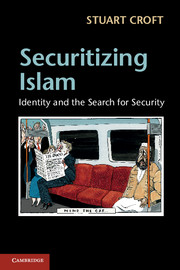Book contents
- Frontmatter
- Contents
- Figures
- Tables
- Acknowledgements
- Introduction
- 1 Ontological security and Britishness
- 2 A post-Copenhagen securitization theory
- 3 ‘Two World Wars and one World Cup’
- 4 ‘New Britishness’ and the ‘new terrorism’
- 5 The construction of ontological insecurity
- Conclusion
- Select bibliography
- Index
Introduction
Published online by Cambridge University Press: 05 June 2012
- Frontmatter
- Contents
- Figures
- Tables
- Acknowledgements
- Introduction
- 1 Ontological security and Britishness
- 2 A post-Copenhagen securitization theory
- 3 ‘Two World Wars and one World Cup’
- 4 ‘New Britishness’ and the ‘new terrorism’
- 5 The construction of ontological insecurity
- Conclusion
- Select bibliography
- Index
Summary
In February 2011, British Prime Minister David Cameron gave a high-profile speech to the Munich International Security Conference. Despite war in Afghanistan and unrest in the Middle East, he said that ‘the biggest threat that we face comes from terrorist attacks, some of which are, sadly, carried out by our own citizens … we should acknowledge that this threat comes in Europe overwhelmingly from young men who follow a completely perverse, warped interpretation of Islam.’ For Cameron, ‘We need to be clear: Islamist extremism and Islam are not the same thing.’ However, British Muslim ‘young men also find it hard to identify with Britain too, because we have allowed the weakening of our collective identity.’ Terrorism from ‘Islamist extremism’ was the fundamental challenge: ‘At stake are not just lives, it is our way of life.’ And the solution was ‘a clear sense of shared national identity that is open to everyone’. The problem stemmed from (warped) Islam; the solution was to be more Britishness. It is that calculation, and that relationship, that this book seeks to interrogate.
In the period since the attacks of 11 September 2001 in the United States, conflict with violent radicalized Muslims has for many in the United Kingdom apparently impacted on their lives only tangentially. Of course, this is not true for the people who died in the London bombings, or for British citizens killed in and affected by attacks abroad, such as those in Bali or Istanbul; nor for soldiers and their relations who have fought in Iraq and Afghanistan. But for the vast majority, Britain may have been involved in conflict, but Britons have not been at war. Most citizens have seemingly been spectators: watching events in the media, occasionally affected in passing, such as by additional airport security. However, this apparent spectator status is actually not so; the securitization of particular identities impacts upon the lives of all who are involved in these securitization processes – those whose identity is part of the securitizing agents, as well as those who are securitized. Securitization, ‘in which egotistical collective political actors (often but not always states) mainly construct their securitizations against (or in the case of security communities with) each other’ is thus often seen as a matter of high politics but, as I will argue, it is also a process that deeply affects social interaction, and everyday life.
- Type
- Chapter
- Information
- Securitizing IslamIdentity and the Search for Security, pp. 1 - 16Publisher: Cambridge University PressPrint publication year: 2012



